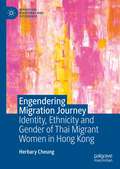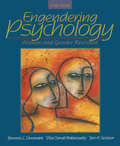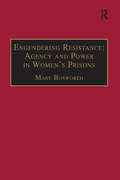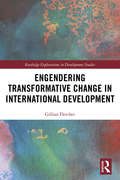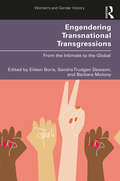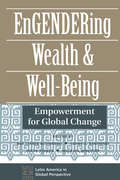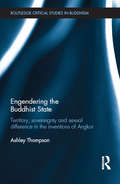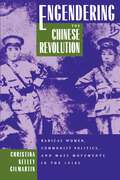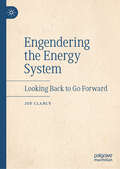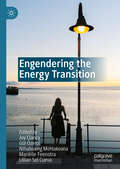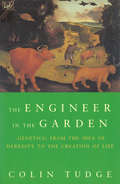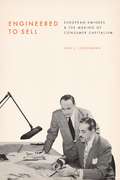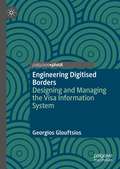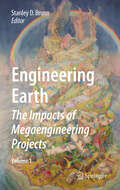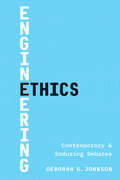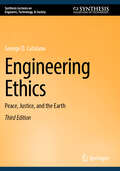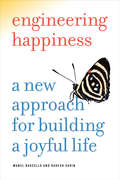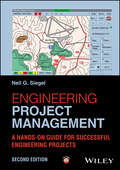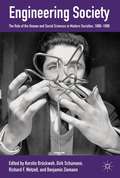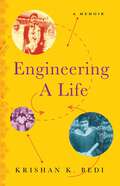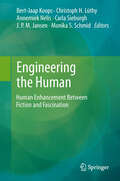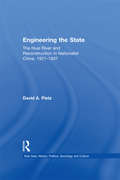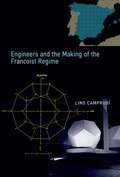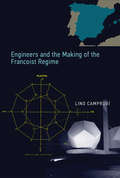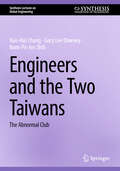- Table View
- List View
Engendering Migration Journey: Identity, Ethnicity and Gender of Thai Migrant Women in Hong Kong (Migration, Diasporas and Citizenship)
by Herbary ZhangDrawing on ethnographic research conducted with the Thai migrant community in Hong Kong between 2016 and 2020, this book provides original insights into the complexity and diversity of identity negotiation, ethnicity navigation, and womanhood reinvention of Thai migrant women in Hong Kong. Allowing research to move beyond standard stories of victimized migrants and domestic workers by focusing on the increasing number of Southeast Asians moving into the middle-class, this ethnographic study of the everyday lived experience of Thai migrant women in Hong Kong will advance a new understanding of transnational migration and mobility at the intersections of gender, ethnicity, class, generation, and religion. This book illustrates the influence of transnationalism and multiculturalism on migrant women's meaning-making and accentuates the importance of diversity within a migrant population — in particular, the importance of maintaining an intersectional perspective to understand the broader phenomenon of contemporary middle-class and professional migration within Southeast Asia.
Engendering Psychology: Women and Gender Revisited
by Florence Denmark Vita Carulli Rabinowitz Jeri A. SechzerEngendering Psychology's treatment of issues is based solidly on scientific evidence and presented in a balanced manner. The text combines a developmental and topical approach. Denmark, Rabinowitz, and Sechzer explore the concept of gender as a social construction across the lines of race, ethnicity, class, age, and sexual orientation, pulling from the exciting new scholarship that has emerged over the last few years. Thoughtful discussion questions emphasize critical thinking skills, as well as encourage students to open a dialogue with both their professors and their peers. This text will help readers understand the concept of gender as a social construct in contrast to the concept of sex, which denotes biological differences. Upon completing this text, readers will have a deeper understanding of women and the knowledge that "woman" is a diverse and multifaceted category.
Engendering Resistance: Agency and Power in Women's Prisons (New Advances in Crime and Social Harm #6)
by Mary BosworthThis book explores how power is negotiated in women’s prisons. Drawing on fieldwork conducted in three penal establishments in England, it analyses how women manage the restrictions of imprisonment and the manner in which they attempt to resist institutional control. It is proposed that power is negotiated on a private, individual level, as women often resist the institution simply by trying to maintain an image of control over their own lives. However, their image of themselves as active, reasoning agents is undermined by institutional regimes which encourage traditional, passive, feminine behaviour at the same time as they deny the women their identities and responsibilities as mothers, wives, girlfriends and sisters. Femininity is, therefore, both the form and the goal of women’s imprisonment. Yet paradoxically, femininity also offers the possibility of resistance, because women manage to rebel by appropriating and changing aspects of it.
Engendering Transformative Change in International Development (Routledge Explorations in Development Studies)
by Gillian FletcherThe Sustainable Development Goals were launched in 2015 with grand ambitions for ending poverty, protecting the planet, and ensuring prosperity for all, with ‘no one left behind’. However, these goals will be impossible to achieve without addressing inequity, inequality, marginalisation, and exclusion related to gender, and to other intersecting social hierarchies linked to deeply emotional, culturally bound norms and judgements of worth. This book asks readers to consider issues of knowledge, power, and effectiveness, emphasising the limits of taking a categorical approach to gender and other social hierarchies, and the importance of process in what is known about generating transformative social change. Engendering Transformative Thinking and Practice in International Development draws on a range of real world examples which demonstrate both the limitations of the frameworks currently in use, and the very real possibilities for change when the intersecting social hierarchies that sustain and create inequity and inequality are challenged. This book brings together theoretical perspectives on social change, gender, intersectionality, and forms of knowledge, concluding with a set of proposals for revitalising a change agenda that recognises and engages with intersectionality and practical wisdom. Perfect for students and scholars of social change, gender, and development, this book will also be useful for practitioners looking for new ideas to help to generate social change.
Engendering Transnational Transgressions: From the Intimate to the Global (Women's and Gender History)
by Eileen Boris Barbara Molony Sandra Trudgen DawsonEngendering Transnational Transgressions reclaims the transgressive side of feminist history, challenging hegemonic norms and the power of patriarchies. Through the lenses of intersectionality, gender analysis, and transnational feminist theory, it addresses the political in public and intimate spaces. The book begins by highlighting the transgressive nature of feminist historiography. It then divides into two parts—Part I, Intimate Transgressions: Marriage and Sexuality, examines marriage and divorce as viewed through a transnational lens, and Part II, Global Transgressions: Networking for Justice and Peace, considers political and social violence as well as struggles for relief, redemption, and change by transnational networks of women. Chapters are archivally grounded and take a critical approach that underscores the local in the global and the significance of intersectional factors within the intimate. They bring into conversation literatures too often separated: history of feminisms and anti-war, anti-imperial/anti-fascist, and related movements, on the one hand, and studies of gender crossings, marriage reconstitution, and affect and subjectivities, on the other. In so doing, the book encourages the reader to rethink standard interpretations of rights, equality, and recognition. This is the ideal volume for students and scholars of Women’s and Gender History and Women’s and Gender Studies, as well as International, Transnational, and Global History, History of Social Movements, and related specialized topics.
Engendering Wealth And Well-being: Empowerment For Global Change (Latin America In Global Perspective Ser.)
by Cathy RakowskiAlthough women often bear the heaviest burden under structural adjustment in Third World countries, there is considerable evidence of women being empowered through their responses to the challenges of economic restructuring. Based on case study material from around the world, this volume explores the significant contributions women make to the wealth and well-being of their families and nations, arguing that women may hold the key to sustainable development. Embodying the new gender and development paradigm, the book reports on research at the frontiers of knowledge and theory about the gendered outcomes of economic transformation, restructuring, and social change. }The new international division of labor and the imposition of structural adjustment on Third World countries has necessitated a reexamination of development policies and a reevaluation of the role of gender in their success or failure. Although women often bear the heaviest burden under structural adjustment, there is also considerable evidence of women being empowered through their responses to the challenges of economic restructuring.Based on case study material from Eastern Europe, the Islamic nations, Africa, China, and Latin America, this volume explores the significant contributions women make to the wealth and well-being of their families and nations. The contributors argue persuasively that women may hold the key to sustainable development, an increasingly critical issue at a time when policymakers are reconsidering the full costs and benefits of a growth-fixated development model.One of the first to embody the new gender and development paradigm, this book reports on research at the frontiers of knowledge and theory about the gendered outcomes of economic transformation, restructuring, and social change. By incorporating voices from the South, it makes a provocative addition to our understanding of the political economy of development and of the relationship between world ecology and the world economy. }
Engendering the Buddhist State: Territory, Sovereignty and Sexual Difference in the Inventions of Angkor (Routledge Critical Studies in Buddhism)
by Ashley ThompsonDrawing from more than a decade of field and archival research, this monograph concerns Cambodian cultural history and historiography, with an ultimate aim of broadening and deepening bases for understanding the Cambodian Theravadin politico-cultural complex. The book takes the form of an interdisciplinary analysis of performative and representational strategies for constituting social collectivities, largely developed at Angkor. The analysis involves extended close readings of a wide range of cultural artefacts including epigraphic and manuscript texts, sculpture and ritual practices. The author proposes a critical re-evaluation of dominant paradigms of Cambodian historiography in view of engendering new histories, or hybrid histories, which make room for previously absent perspectives and voices, while developing new theoretical tools engaging with and partially derived from "indigenous" narrative practices in the broadest sense. In this history-making process the historical event is shown to never be entirely separable from its aesthetic representation. Particular attention is paid to the roles of sexual difference in such (re)constructions of history. The book presents a theory of power capable of accounting for the historical phenomena by which vernacular cultures appropriate, subvert and submit to cosmopolitan forces. It charts out a novel approach to the study of classical Southeast Asian materials, and is of interest to students and scholars of Asian Art, Religion and Philosophy, Buddhism and Southeast Asian History.
Engendering the Chinese Revolution: Radical Women, Communist Politics, and Mass Movements in the 1920s
by Christina Kelley GilmartinChristina Kelley Gilmartin rewrites the history of gender politics in the 1920s with this compelling assessment of the impact of feminist ideals on the Chinese Communist Party during its formative years. For the first time, Gilmartin reveals the extent to which revolutionaries in the 1920s were committed to women's emancipation and the radical political efforts that were made to overcome women's subordination and to transform gender relations.Women activists whose experiences and achievements have been previously ignored are brought to life in this study, which illustrates how the Party functioned not only as a political organization but as a subculture for women as well. We learn about the intersection of the personal and political lives of male communists and how this affected their beliefs about women's emancipation. Gilmartin depicts with thorough and incisive scholarship how the Party formulated an ideological challenge to traditional gender relations while it also preserved aspects of those relationships in its organization.
Engendering the Energy System: Looking Back to Go Forward
by Joy ClancyThis book brings together a comprehensive overview of gender and energy to provide an invaluable resource for researchers and practitioners. It addresses how energy access at the individual/household/community level is gendered in terms of decision making and where and how benefits accrue. At the institutional level it examines the role women play in the sector and the barriers they have to overcome to participate. At the policy level experiences with mainstreaming gender into energy policy are discussed. The book provides examples from both the Global South and the Global North and is set in the context of the energy transition. The book is a timely publication that highlights the global energy initiatives of SEforAll, the SDGs and the Paris Agreement on Climate Change.
Engendering the Energy Transition
by Gül Özerol Joy Clancy Nthabiseng Mohlakoana Mariëlle Feenstra Lillian Sol CuevaThis book brings together diverse contributions exploring the integration of gender equality in current national energy policies and international energy frameworks across the Global South and North. Taking a multi-disciplinary approach, this collection contributes to building a body of independent empirical evidence about the impacts of the energy transition on socio-economic outcomes, with a focus on gender differentiated choices of energy forms. The book includes short reflections in each chapter allowing the reader to explore the content from an alternative perspective. The common thread enabling the book to actively contribute to engendering the energy transition is its approach to the topic from a primarily ‘gender’ driven perspective. The book draws many useful lessons from practice and shares gender mainstreaming tools for use across the Global South and the North. Such an approach brings novel insights from theoretical, methodological and practical perspectives, which further promotes cross-disciplinary learning and will be of interest to researchers and practitioners from across the Energy and Gender disciplines.
Engineer In The Garden
by Colin TudgeToday we are developing a science that could change the world - for good or ill - more quickly and more profoundly than ever before. The science of genetics promises - or threatens - nothing less than the creation of life. Colin Tudge leads the reader gently through the deepest intricacies of genetics. He traces its history. He explores its awesome power and its current applications. And he speculates on its thrilling - or terrifying - future. He has written an essential book for anyone interested in the future of the human race.
Engineered to Sell: European Émigrés and the Making of Consumer Capitalism
by Jan L. LogemannThe mid-twentieth-century marketing world influenced nearly every aspect of American culture—music, literature, politics, economics, consumerism, race relations, gender, and more. In Engineered to Sell, Jan L. Logemann traces the transnational careers of consumer engineers in advertising, market research, and commercial design who transformed capitalism from the 1930s through the 1960s. He argues that the history of marketing consumer goods is not a story of American exceptionalism. Instead, the careers of immigrants point to the limits of the “Americanization” paradigm. Logemann explains the rise of a dynamic world of goods and examines how and why consumer engineering was shaped by transatlantic exchanges. From Austrian psychologists and little-known social scientists to the illustrious Bauhaus artists, the emigrés at the center of this story illustrate the vibrant cultural and commercial connections between metropolitan centers: Vienna and New York; Paris and Chicago; Berlin and San Francisco. By focusing on the transnational lives of emigré consumer researchers, marketers, and designers, Engineered to Sell details the processes of cultural translation and adaptation that mark both the midcentury transformation of American marketing and the subsequent European shift to “American” consumer capitalism.
Engineering Digitised Borders: Designing and Managing the Visa Information System
by Georgios GlouftsiosThis book focuses on the Visa Information System (VIS): a large-scale data infrastructure interconnecting a multiplicity of state authorities that enact border security and migration management in the European Union. The VIS is embedded within a setting of pan-European IT systems that filter international mobility, identify threatening elements, hamper the travels of poor, racialized, and alienated subjects, while at the same time facilitate the circulation of those expected to generate financial and other kinds of capital. The book examines the engineering of the VIS by analyzing how it was designed before its deployment in the field of border security, and how it is maintained to ensure continuous and secure operation. It illustrates how engineering processes that render the VIS functional are not just technoscientific, but inherently political, as they (re)configure and maintain the power to govern international mobility by digital means.
Engineering Earth: The Impacts of Megaengineering Projects
by Stanley D. BrunnThis is the first book to examine the actual impact of physical and social engineering projects in more than fifty countries from a multidisciplinary perspective. The book brings together an international team of nearly two hundred authors from over two dozen different countries and more than a dozen different social, environmental, and engineering sciences. Together they document and illustrate with case studies, maps and photographs the scale and impacts of many megaprojects and the importance of studying these projects in historical, contemporary and postmodern perspectives. This pioneering book will stimulate interest in examining a variety of both social and physical engineering projects at local, regional, and global scales and from disciplinary and trans-disciplinary perspectives.
Engineering Ethics: Contemporary and Enduring Debates
by Deborah G. JohnsonAn engaging, accessible survey of the ethical issues faced by engineers, designed for students The first engineering ethics textbook to use debates as the framework for presenting engineering ethics topics, this engaging, accessible survey explores the most difficult and controversial issues that engineers face in daily practice. Written by a leading scholar in the field of engineering and computer ethics, Deborah Johnson approaches engineering ethics with three premises: that engineering is both a technical and a social endeavor; that engineers don&’t just build things, they build society; and that engineering is an inherently ethical enterprise.
Engineering Ethics: Peace, Justice, and the Earth (Synthesis Lectures on Engineers, Technology, & Society)
by George D. CatalanoIn the original two editions of Engineering Ethics: Peace, Justice, and the Earth, a response of the engineering profession to the challenges of security, poverty and underdevelopment, environmental sustainability, and native cultures was described. Ethical codes, which govern the behavior of engineers, were examined from a historical perspective linking the prevailing codes to models of the natural world. A new ethical code based on a recently introduced model of Nature as an integral community was provided and discussed. Applications of the new code were described using a case study approach. The proposed third edition will build on the foundational material included in the previous two editions. Over the course of the last decade new and profoundly challenging ethical issues (synthetic biology, artificial intelligence, climate change and the sixth extinction) have arisen in the engineering profession. The notion of an integral community has been more fully developed. The proposed book will include an exploration of these issues as well as provide the reader with a better understanding of the historical development of ethical reasoning and consider future possibilities. Implications of the innovative ideas in ethics and design on engineering education are also considered.
Engineering Happiness
by Manel Baucells Rakesh SarinManel Baucells and Rakesh Sarin have been conducting ground-breaking research on happiness for more than a decade, and in this book they distill their provocative findings into a lively, accessible guide for a wide audience of readers. Integrating their own research with the latest thinking in the behavioral and social sciences--including management science, psychology, and economics--they offer a new approach to the puzzle of happiness. Woven throughout with wisdom from the world's religions and literatures, Engineering Happiness has something to offer everyone--regardless of background, profession, or aspiration--who wants to better understand, control, and attain a more joyful life. * Shows how a few major principles can explain how happiness works and why it is so elusive * Demonstrates how the essence of attaining happiness is choice * Explores how to avoid happiness traps * Tells how to recognize happiness triggers in everyday life
Engineering Project Management: A Hands-On Guide for Successful Engineering Projects
by Neil G. SiegelAn engineering-focused approach to project management techniques and strategies Engineering projects are vital for modern society and global human survival, but many engineering projects fail, in large part due to poor and/or ineffective management. These failures have led to a desire to identify those techniques and mindsets that can lead consistently to successful engineering projects. The first edition of this book, Engineering Project Management, has served as the essential overview to engineering-based project management methods, tools, processes, and mind-sets. Offering a practical, step-by-step guide to applying project management techniques in engineering settings, it draws upon active learning approaches and the author’s extensive experience to create a thorough and cutting-edge guide. This second edition is now updated to reflect transformative recent developments in both technology and project management, and remains an indispensable tool for project managers and engineers alike. Readers of this second edition of Engineering Project Management will also find: Updated coverage of the social aspects of project management, along with other soft skills, throughout the volume Detailed discussion of topics including project life-cycle, identification and management of stakeholders, cost estimation, schedule estimation, monitoring of your project, engineering economics, engineering ethics, and many more A structure that aligns perfectly with a single-semester course, alternating lectures with facilitated lab sessions Engineering Project Management is ideal for advanced undergraduates, graduate students, and instructors in courses in Engineering Project Management, as well as professional engineers and early career practitioners who need to brush up on their project management skills.
Engineering Society
by Benjamin Ziemann Dirk Schumann Richard F. Wetzell Kerstin BrückwehExplaining crime by reference to abnormalities of the brain is just one example of how the human and social sciences have influenced the approach to social problems in Western societies since 1880. Focusing on applications such as penal policy, therapy, and marketing, this volume examines how these sciences have become embedded in society.
Engineering a Life: A Memoir
by Krishan K. BediIncluded on BookBub&’s "The Most Exciting Memoirs Coming Out in 2018&” list Krishan Bedi came to the United States in December of 1961 at the tender age of twenty. He had only $300 in his pocket, and he had made it out of his small village in India on sheer faith, determined to get education in the US. For him, there was no option but to succeed—so he began his new life in Knoxville, Tennessee, where he had to adapt to the culture shock not only of being in the US but a Punjabi man in the South in the 1960s. Engineering a Life is an examination of Bedi&’s life, and how he has handled the plethora of curve balls thrown his way with determination, humor, and an unwavering faith that everything would work out. This is a book about values and faith and the importance of friendship, family, and hard work. It&’s a story about achieving the American Dream, proving that no matter how thoroughly you map out your life&’s journey, no matter how many blueprints you draw up, when you veer off the course you&’ve plotted—as we all do, somehow, in the end—you end up where you&’re supposed to be.
Engineering the Human
by Monika S. Schmid Carla Sieburgh Bert Jaap Koops J.P.M. Jansen Annemiek Nelis Christoph H. LüthyThe volume is collection of articles treating the topic of human improvement/enhancement from a variety of perspectives - philosophical, literary, medical, genetic, sociological, legal etc. The chapters in this volume treat not only those aspects that most immediately come to mind when one thinks of 'human enhancement', such as genetic engineering, cloning, artificial implants and artificial intelligence etc. Somewhat less obvious aspects include evolutionary perspectives in connection with the prolongation of the human lifespan, plastic surgery since its beginnings, and questions such as whether the distinction between 'natural' and 'artificial' can really be drawn at all and how it has been conceived across the ages, or what the legal implications are of recent developments and techniques. Many papers make links to the representation of these developments in popular culture, from Jules Verne through Aldous Huxley to the movie Gattaca, address the hopes and fears that come with them as well as the question how realistic these are. While all chapters are written by scientists at the international top of their respective fields, all are accessible to a non-specialist audience and eminently readable. We believe that they represent a state-of-the art overview of questions that are of interest to a large audience. The book thus targets a non-specialist audience with an interest in philosophical, sociological, scientific and legal issues involved in both traditional and recent matters concerning the desire of mankind to improve itself, the human body, the human mind and the human condition. It is unique in that it brings together all these aspects within a coherent and cohesive collection.
Engineering the State: The Huai River and Reconstruction in Nationalist China, 1927–37 (East Asia: History, Politics, Sociology and Culture)
by David PietzFirst published in 2002. Routledge is an imprint of Taylor & Francis, an informa company.
Engineers and the Making of the Francoist Regime
by Lino CamprubíIn this book, Lino Camprubí argues that science and technology were at the very center of the building of Franco's Spain. Previous histories of early Francoist science and technology have described scientists and engineers as working "under" Francoism, subject to censorship and bound by politically mandated research agendas. Camprubí offers a different perspective, considering instead scientists' and engineers' active roles in producing those political mandates. Many scientists and engineers had been exiled, imprisoned, or executed by the regime. Camprubí argues that those who remained made concrete the mission of "redemption" that Franco had invented for himself. This gave them the opportunity to become key actors -- and mid-level decision makers -- within the regime. Camprubí describes a series of projects across Spain undertaken by the civil engineers and agricultural scientists who placed themselves at the center of their country's forced modernization. These include a coal silo, built in 1953, viewed as an embodiment of Spain's industrialized landscape; links between laboratories, architects, and the national Catholic church (and between technology and authoritarian control); vertically organized rice production and research on genetics; river management and the contested meanings of self-sufficiency; and the circulation of construction standards by mobile laboratories as an engine for European integration. Separately, each chapter offers a fascinating microhistory that illustrates the coevolution of Francoist science, technology, and politics. Taken together, they reveal networks of people, institutions, knowledge, artifacts, and technological systems woven together to form a new state.
Engineers and the Making of the Francoist Regime (Transformations: Studies in the History of Science and Technology)
by Lino CamprubiHow engineers and agricultural scientists became key actors in Franco's regime and Spain's forced modernization.In this book, Lino Camprubí argues that science and technology were at the very center of the building of Franco's Spain. Previous histories of early Francoist science and technology have described scientists and engineers as working “under” Francoism, subject to censorship and bound by politically mandated research agendas. Camprubí offers a different perspective, considering instead scientists' and engineers' active roles in producing those political mandates. Many scientists and engineers had been exiled, imprisoned, or executed by the regime. Camprubí argues that those who remained made concrete the mission of “redemption” that Franco had invented for himself. This gave them the opportunity to become key actors—and mid-level decision makers—within the regime.Camprubí describes a series of projects across Spain undertaken by the civil engineers and agricultural scientists who placed themselves at the center of their country's forced modernization. These include a coal silo, built in 1953, viewed as an embodiment of Spain's industrialized landscape; links between laboratories, architects, and the national Catholic church (and between technology and authoritarian control); vertically organized rice production and research on genetics; river management and the contested meanings of self-sufficiency; and the circulation of construction standards by mobile laboratories as an engine for European integration. Separately, each chapter offers a fascinating microhistory that illustrates the coevolution of Francoist science, technology, and politics. Taken together, they reveal networks of people, institutions, knowledge, artifacts, and technological systems woven together to form a new state.
Engineers and the Two Taiwans: The Abnormal Club (Synthesis Lectures on Global Engineering)
by Gary Lee Downey Kuo-Hui Chang Bono Po-Jen ShihThe identity of Taiwan is a matter of intense local and international debate. This book shows how engineers helped produce two distinct visions of the land of Taiwan and its people, elevating the value of engineering as a career path in the process. The book describes how the technical work of engineers, which typically avoids partisan politics, can actually contribute to partisan differences and conflict. In most countries, the rise of engineering is about the emergence of a single dominant vision of the country. In Taiwan, two distinct visions of the land and its people emerged, owing to the presence of two distinct geographical identities—islanders and mainlanders. The distributed mode of production in the electronics industry proved to be transformative and created an “abnormal boys’ club” of engineers, as one group called themselves. Because the two communities were influenced by contrasting geographical identities, they felt as though they were working for different Taiwans. "What a book. Engineers and the Two Taiwans traces how engineers creatively crafted professional identities and pathways in the cracks of multiple, shifting empires – and in so doing helped create Taiwan as a thing-unto-itself. In showing how engineers shaped and were shaped by geopolitics and the birth of a new electronics industry, the book opens up fresh perspectives on longstanding questions about who engineers are, how they are trained, where they ought to work, and ultimately what engineering is for. These engineers did politics through their material commitments even as they avoided partisan politics." Jessica M. Smith, Editor-in-chief, Engineering Studies, Professor, Engineering, Design, and Society Department, Colorado School of Mines "This book explores Taiwan’s dynamic industrial evolution over the past century through the lens of different engineers’ social dynamics, identity, values, and compelling narratives. It offers insights into Taiwanese own perceptions in the electronics industry and prompts reflection on how countries navigate domestic and international technology policies and social progress. You will come to appreciate how engineers in Taiwan today bear continuing responsibilities to connect their technical work to its land and people, even when their own commitments differ from one another." Minn-Tsong Lin, Deputy Minister, National Science and Technology Council, Taiwan, Distinguished Professor, Department of Physics, National Taiwan University
